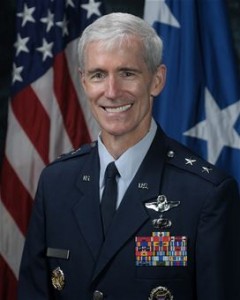USAF edges toward career intel chief
When then-Brig. Gen. Robert Otto took command of the Air Force's U-2 and Global Hawk planes in 2008, one of his first steps was to sit down with rank-and-file intelligence officers. Otto wanted to understand the intelligence process, not just the collections gathered by the 9th Reconnaissance Wing at Beale Air Force Base, Calif. The sessions were a good way for Otto, a U-2, Global Hawk and F-15 pilot, to start building credibility among career intel officers.
The approach paid off. Otto has been confirmed by the Senate to become the Air Force’s next intel chief. He'll pin on a third star in late June and replace Lt. Gen. Larry James, who is retiring.
Air Force intelligence professionals respect Otto, but his arrival brings mixed emotions for them.
Once again, someone from outside the ranks of the Air Force’s career intelligence officers has been chosen to serve as the service’s deputy chief of staff for intelligence, surveillance and reconnaissance. It's frustrating to Air Force intel officers. They look at the Army and see intel lifers like Lt. Gen. Mary Legere rising to the top.
A lot has improved for Air Force intel officers since a 2005 C4ISR Journal article used the term “glass ceiling” to describe their flagging promotion rates. But Otto’s selection confirms that not enough has changed to put a career person in the job, one officer said.
Emotions are mixed, but bitterness isn't one of them. Otto’s credentials are hard to question. After Beale, he went to the Pentagon to serve as director of intel capabilities at Air Force headquarters. Since July 2011, he's been running the service’s intelligence field operations as commander of the Air Force Intelligence, Surveillance and Reconnaissance Agency at Joint Base San Antonio-Lackland in Texas.
Otto’s most notable role in recent years might be an unofficial one. He's the expert the service calls on whenever intel mistakes are made in Afghanistan. He hasn't hesitated to criticize his fellow pilots when the facts lead there.
In 2010, Otto led an investigation into the killing of 23 civilians in Uruzgan province. He blamed the mistake partly on confusing communications by an Air Force Predator crew. In 2011, a Predator crew killed a Marine and a Navy corpsman in the Sangin Valley after mistaking them for Taliban fighters. That was the last straw.
Otto successfully pushed to establish direct voice links between the Predator crews and analysts at the Air Force’s Distributed Ground System fusion sites. Analysts were viewing full motion video simultaneously with the Predator crews but they could only send computer chat messages if they saw things going wrong.
Intel officers respect Otto for all that. His career over the last five years could be seen as a bridge toward the day when a career intel officer is picked for the top intel job.
It will happen eventually, one officer said.




I don’t buy the implied discrimination against senior intel staff. Personally, I would like a head of intel that understands broader operations and where intel contributes to operations. If such a leader is not being drawn from the ranks of intel careerists, then perhaps then need to look inwards for the reasons.
It may even be that intel is one of those streams that is too specialised (putting aside traditional factionalisation within intel communities) to aspire to have one of their own rise to a three star lead appointment? Possibly those with the intel professions with higher aspirations need to be more generalists than specialists?
Actually, the main critique coming from RAND’s review of Intel’s prospects for advancement was that it was producing officers that are too generalized and that there was more room for specialization.